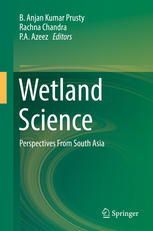

Most ebook files are in PDF format, so you can easily read them using various software such as Foxit Reader or directly on the Google Chrome browser.
Some ebook files are released by publishers in other formats such as .awz, .mobi, .epub, .fb2, etc. You may need to install specific software to read these formats on mobile/PC, such as Calibre.
Please read the tutorial at this link: https://ebookbell.com/faq
We offer FREE conversion to the popular formats you request; however, this may take some time. Therefore, right after payment, please email us, and we will try to provide the service as quickly as possible.
For some exceptional file formats or broken links (if any), please refrain from opening any disputes. Instead, email us first, and we will try to assist within a maximum of 6 hours.
EbookBell Team

4.0
26 reviewsThis book is an attempt to acknowledge the discipline ‘wetland science’ and to consolidate research findings, reviews and synthesis articles on different aspects of the wetlands in South Asia. The book presents 30 chapters by an international mix of experts in the field, who highlight and discuss diverse issues concerning wetlands in South Asia as case studies. The chapters are divided into different themes that represent broad issues of concern in a systematic manner keeping in mind students, researchers and general readers at large. The book introduces readers to the basics and theory of wetland science, supplemented by case studies and examples from the region. It also offers a valuable resource for graduate students and researchers in allied fields such as environmental studies, limnology, wildlife biology, aquatic biology, marine biology, and landscape ecology.
To date the interdisciplinary field ‘wetland science’ is still rarely treated as a distinct discipline in its own right. Further, courses on wetland science aren’t taught at any of the world’s most prestigious universities; instead, the topics falling under this discipline are generally handled under the disciplines ‘ecology’ or under the extremely broad heading of ‘environmental studies’. It is high time that ‘Wetland Science’ be acknowledged as an interdisciplinary sub-discipline, which calls for an attempt to consolidate its various subtopics and present them comprehensively. Thus, this book also serves as a reference base on wetlands and facilitates further discussions on specific issues involved in safeguarding a sustainable future for the wetland habitats of this region.